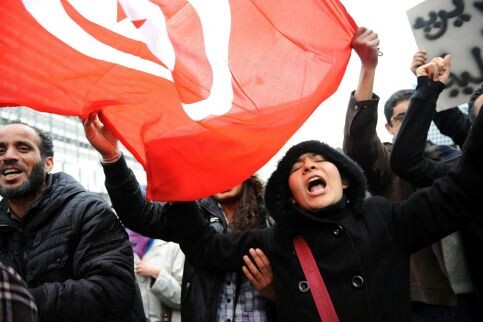The Electronic Intifada 31 January 2011

The uprising in Tunisia, which catalyzed the overthrow of the Mubarak regime in Egypt, offers inspiration for social justice activists everywhere. (AFP)
In the last several days, Tunisia and Egypt have shown us what is possible when people are no longer afraid of those in power who deny them their rights and rob them of a life of freedom and dignity.
Government oppression of peoples’ democratic rights is not something endured only in the Middle East, however. Here in the United States, there has been a long history of repression of peoples’ struggles. Today that repression is keenly felt by members of the US Muslim and Arab communities, and increasingly by those who stand in solidarity with and who organize in support of the Palestinian people.
We have seen this with the persecution of Palestinian and Arab community leaders in the US like Muhammad Salah, Dr. Abdelhaleem Ashqar, Dr. Sami al-Arian and the Holy Land Five — all put on trial by the US government because of their work to educate Americans about the impact of US aid to Israel, and to raise money for humanitarian assistance to Palestinians living under the thumb of Israel’s occupation.
I am one of 23 individuals who have been recently subpoenaed by the FBI and who face a federal grand jury because of our work to end US military aid to Israel, and because we organize in solidarity with the people of Palestine. Seven of the 23 subpoenaed activists are Palestinians who also organize within their community in the US. A grand jury is a secret court designed to get an indictment and it is clear that the US government wants to put anti-war and solidarity activists on trial. Because of this, and even though it means we risk being put in jail, all of us who have have been summoned to testify have refused to participate in this attack on our movement.
Moreover, repression and intimidation don’t only come from our government. The backlash against Palestinian solidarity activists in the US has grown more severe as the movement globally claims more victories. Well-funded organizations whose narrow mission is to protect and promote US aid to Israel and maintain unchecked diplomatic support of the apartheid state smear those who speak out for truth and justice.
The campus boycott, divestment and sanctions movement has been particularly targeted by this backlash. Students for Justice in Palestine activists and organizers with similar campus groups have been victimized by hate crimes and physically threatened, their property on campus defaced, denied funding for their activities and their faculty supporters subjected to institutional censorship because of threats and harassment from outside groups.
Though this repression against our movement in the US is very real, not for a single day should any of us stop organizing in support of the liberation of Palestine, against the wars and occupations in Iraq and Afghanistan, and against US support of dictatorships in countries like Egypt and Tunisia. It is our government and our tax money that perpetuates the deadly status quo in the Middle East and the Arab World. We in the United States must continue to organize to end the wars and occupations by cutting off the billions of dollars and making sure that instead of being spent on war and death, and oppression of liberation struggles, our tax money stays at home and is invested in our schools and communities.
The backlash against the just movement in support of the liberation of Palestine and other peoples’ struggles in the Middle East is indicative the desperation of those interested in maintaining the status quo of US military aid to Israel.
Ever since the Palestinian call for boycott, divestment and sanctions was issued by a broad spectrum of political forces and civil society organizations in 2005, the global movement that has formed in support of that call has claimed victory after victory. Those who profit from the occupation and support it practically and ideologically find themselves confronted by this movement at nearly every turn, and this movement shows once and for all that the charade of negotiations brokered by the US is hardly the way forward.
Like the US was amongst the last backers of apartheid South Africa, so it is with apartheid Israel, which is increasingly isolated in the international arena. The boycott, divestment and sanctions movement against apartheid Israel, like it did with South African apartheid, will force the US government to cut off the military, monetary and diplomatic support.
But in the meantime, as Ali Abunimah wrote for The Electronic Intifada yesterday, the fall of the Mubarak regime will mean that Israel will have one less major ally. As Israel becomes more isolated, it will also become more desperate — as will its supporters in the US, some of whom are being funded to disrupt what they will ultimately find to be an unstoppable movement.
Let us take our cue from our brave sisters and brothers who are resisting injustice in Egypt and Tunisia and Yemen, in Iraq and Palestine, and Lebanon and Afghanistan and let us never stop working towards freedom and a life with dignity for oppressed peoples in the Middle East as well as here at home. Let it be known that we too are not afraid.
Maureen Clare Murphy is Managing Editor of The Electronic Intifada and an organizer with the Palestine Solidarity Group-Chicago. This essay is based on a speech she gave at a Chicago rally in solidarity with Egypt on 29 January 2011. For more information about the activists facing a grand jury, visit stopfbi.net
Related Links





